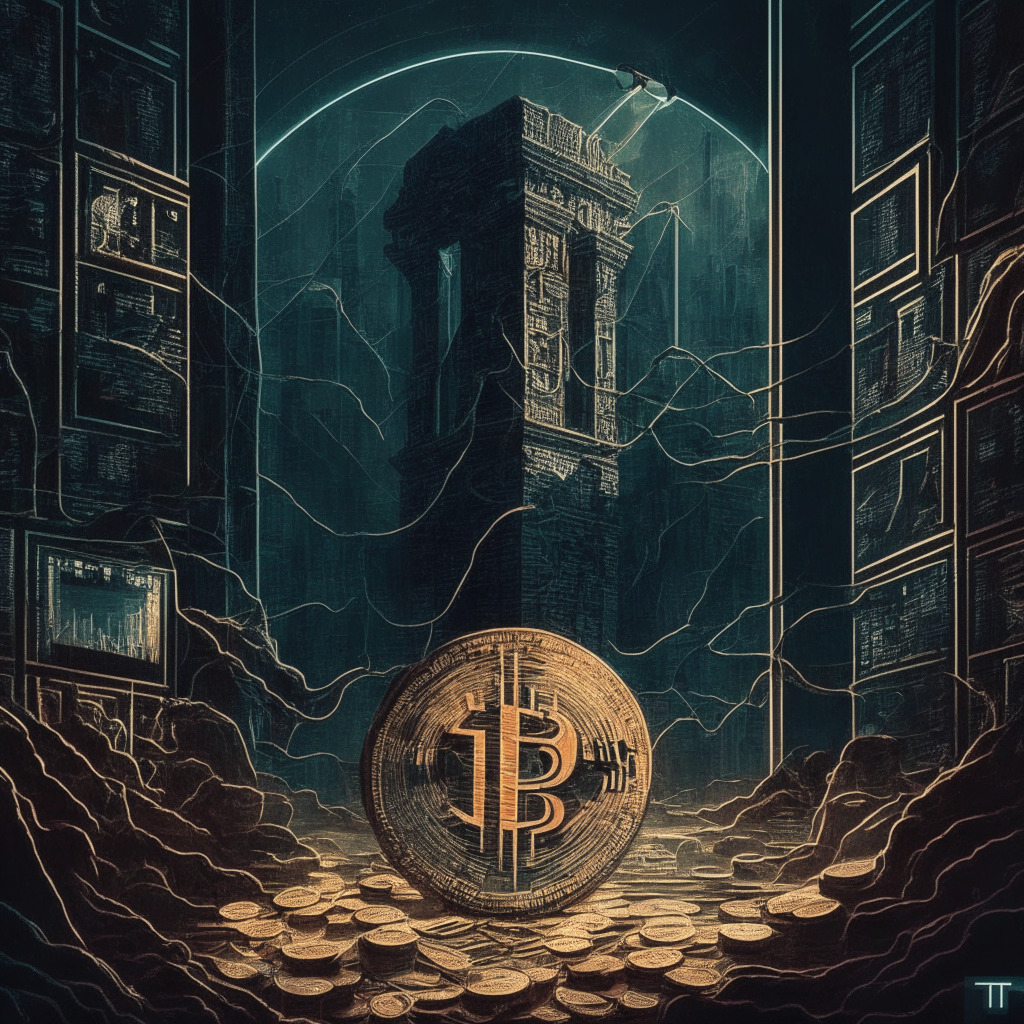The U.S. saw a 0.6% increase in its consumer price index (CPI) in August, the biggest growth in inflation in 2021, leading to a 3.7% year-over-year rise. Significant factors contributing to this include energy prices, food prices and notably, a 0.3% increase in housing costs, which makes up about a third of the CPI’s weight.
Search Results for: U.S. Treasury Department
PayPal’s Stablecoin Revolution: Evolving Crypto Landscape with Regulatory Safeguards
PayPal launches its own stablecoin, PYUSD, representing a pioneering move in bringing regulatory oversight and customer asset protection to the crypto world. The coin, developed with Paxos, is closely monitored by the New York Department of Financial Services to secure it against bankruptcy risks.
Navigating Uncharted Waters: The Question of Crypto Regulation and Tax Evasion
Senators Elizabeth Warren and Bob Casey are urging strict enforcement of crypto reporting requirements within the Infrastructure Investment and Jobs Act (IIJA), suggesting clear tax reporting guidelines for digital asset “brokers”. This measure aims to close the $50 billion “crypto tax gap”, addressing the tax evasion in the crypto industry.
Navigating Rough Waters: Binance’s New Compliance Leadership Amid Regulatory Challenges
“Binance announced that Kristen Hecht assumed the role of Deputy Chief Compliance Officer amidst potential fraud charges. Her responsibilities include strengthening compliance provisions, combating financial crime risks and overseeing anti-money laundering teams. This occurs as Binance navigates through regulatory scrutiny in the US and Europe.”
Binance Bolsters Defense with New Deputy Chief Amid Mounting Regulatory Scrutiny
Binance, the renowned cryptocurrency exchange, has appointed Kristen Hecht as its new Deputy Chief Compliance and Global Money Laundering Reporting Officer amid potential fraud charges from US regulators. Hecht will monitor key areas while managing company’s compliance program and liaising with regulators and industry bodies.
Closing the $50 billion Crypto Tax Gap: Urgent Measures or Rushed Consequences?
Democratic Senators, including Elizabeth Warren and Bernie Sanders, urged the IRS and the Treasury Department to expedite new crypto tax regulations to close a potential “$50 billion crypto tax gap.” They expressed concerns about potential loss of $1.5 billion in government tax revenue for 2024 due to delay in the implementation. This is amid a wider conversation for more transparency in the bourgeoning cryptocurrency sector.
Navigating the New Terrain: Implications of the NDAA Bill on Crypto Privacy and Regulation
The U.S. Senate has passed the National Defense Authorization Act, imposing new regulations on the digital asset world, including privacy coins and crypto mixers. The regulations aim to stem crypto-related fraud and are expected to force an elevation in crypto regulatory standards, obliging authorities to crack down on anonymous crypto transactions. The discourse reflects the conflict between privacy freedoms versus governance needs in the crypto sector.
US Crypto Regulation: A Patchy Landscape and the Urgent Need for Unified Oversight
“A recent report by the United States Government Accountability Office (GAO) shows significant regulatory gaps in the crypto assets market. It highlights the need for unified coordination to counter blockchain risks and establish a timely response system. Particularly, the report emphasizes rising concerns around stablecoins and decentralized finance’s escalating risks to the crypto and macro economy.”
Decoding FedNow: U.S Federal Reserve’s Stand on CBDCs and Future of Instant Payment Services
The U.S. Federal Reserve’s new instant payment service, FedNow, set to launch in July 2023, is not associated with central bank digital currencies (CBDCs), but operates within the fiat ecosystem. Despite testing by numerous institutions and growing CBDC interest globally, the Federal Reserve reiterates, it requires legislative authorization before issuing a CBDC.
Digital Asset Market Structure: A Path for Crypto Regulation or Hindrance to SEC’s Authority?
House Financial Services Committee Chair Maxine Waters proposed the Digital Asset Market Structure bill, offering US-based digital asset exchanges a pathway for SEC registration, seeking regulatory clarity for the crypto industry. The legislation aims to approve digital securities, commodities, and stablecoins for trading while providing guidelines to distinguish between crypto-based securities and commodities.
Collapse of Crypto-Friendly Banks: Time to Rethink Deposit Insurance Limits?
Circle and Sequoia Capital were among top depositors in collapsed Silicon Valley Bank (SVB), raising concerns about depositor fund security and current regulations in the crypto space. The situation highlights the potential need for increased deposit insurance limits as more financial institutions embrace cryptocurrencies and blockchain technology.
Emerging Darknet Task Force: Unveiling Future of Crypto Regulation and Criminal Adaptation
The “Darknet Marketplace and Digital Currency Crimes Task Force” showcases the growing concern related to digital currencies in crime. This task force, consisting of agents from various federal agencies, seeks to dismantle criminal organizations taking advantage of digital currencies’ anonymity and raises questions about the future of cryptocurrencies and the increasing need for regulatory measures.
SEC Crackdown on DeFi and Stablecoins: Analyzing Pros, Cons, and Market Implications
The SEC is potentially targeting decentralized finance (DeFi) and stablecoins, including Tether (USDT) and USD Coin (USDC), in its enforcement crackdown, according to a Berenberg report. Stablecoins, essential to the DeFi ecosystem, have raised national security concerns due to weak sanctions and money laundering controls. The SEC aims to weaken DeFi’s capacity to rival regulated exchanges and lenders.
Darknet Task Force: Balancing Crypto Crime Fight and Blockchain Innovation
The Department of Homeland Security has formed the “Darknet Marketplace and Digital Currency Crimes Task Force,” an interagency group aimed at investigating crypto and darknet crimes and increasing collaboration. The Task Force will play a crucial role in mitigating criminal activity impact while balancing regulation and innovation in the evolving crypto industry.
Balancing Privacy and Efficiency in Retail CBDCs: Pros, Cons, and Conflicts
U.S. Treasury official Graham Steele highlighted the importance of privacy and anonymity in developing a potential retail Central Bank Digital Currency (CBDC) and suggested that Privacy Enhancing Technologies be considered for preserving user anonymity. Steele also discussed pros, cons, and challenges, including minimizing illegal transactions and ensuring privacy.
US CBDC Dilemma: Balancing Privacy, Security, and Financial Inclusion in a Digital Era
The Treasury Department leads an interagency working group studying a potential U.S. central bank digital currency (CBDC). As digital currencies gain traction, finding a balance between innovation, trust, protection, privacy, and financial inclusion is crucial for the nation’s digital financial future.
Crypto Market Resilience Amid US Debt Dilemma and Regulatory Challenges
Crypto market displays resilience amid regulatory challenges and US debt concerns, with experts predicting pre-FOMC market correction. Experts expect correction and consolidation between $25K-$27K levels, while the decline in bitcoin options put/call ratio indicates reduced investor concerns. Ethereum’s post-merge performance captures market attention through increased staking demand and realized deflationary promise.
Debt Ceiling Deal Impact: Crypto Stability Amid Recession Fears
Positive market sentiments in global stock and crypto markets follow the Biden-McCarthy Debt Ceiling Deal and U.S. Federal Reserve’s potential interest rate decision. However, risks remain for volatile assets like cryptocurrencies due to uncertain macroeconomic conditions, regulatory challenges, and weak technical charts. Conduct thorough research before investing in cryptocurrencies.
Debt Ceiling Deal Looms: Analyzing Its Impact on Cryptocurrency and Traditional Finance Markets
US President Joe Biden and Republican leader Kevin McCarthy are finalizing a deal to raise the $31.4 trillion debt ceiling, while core PCE inflation hits 4.7%, impacting interest rates and causing Bitcoin price drop. The debt ceiling deal and inflation data reveal the complex relationship between traditional finance and the cryptocurrency market.
Crypto Market Turmoil: US Debt Default Deadline, Recovery Hopes, and 2024 Watershed Moment
Cryptocurrencies like Bitcoin and Ethereum may experience massive selloffs due to the approaching US debt default deadline, predicts Blockchain.com CEO Peter Smith. However, cryptocurrencies are expected to bounce back soon after any initial impact. The ongoing debt ceiling talks have led to Bitcoin investors panicking and prices dipping, highlighting the need for market vigilance.
Tornado Cash Lawsuit: Unraveling Complexities in Smart Contracts, Ownership, and Free Speech
A group of crypto engineers and investors are suing the U.S. Department of Treasury over sanctions against Tornado Cash’s privacy protocol, claiming violation of the International Emergency Economic Powers Act (IEEPA) and First Amendment rights. The lawsuit raises questions about property, unincorporated associations, and free speech in blockchain technology.
Digital Asset AML Act: Regulating Crypto or Hindering Blockchain Progress?
Senators Elizabeth Warren and Roger Marshall have introduced the Digital Asset Anti-Money Laundering Act, aiming to close loopholes in the crypto industry. However, the proposed law seems at odds with the reality that most money laundering cases still involve fiat currencies, and law enforcement’s proven ability to prosecute crypto-related money laundering. The bill’s necessity should be scrutinized, considering potential alternatives without harming underlying technology.
US Debt Default and Stablecoins: How Circle Aims to Protect USDC Reserves with Repo Agreements
Circle Internet Financial is adjusting the reserves behind the $30 billion USD Coin, considering the possibility of a U.S. government debt default. BlackRock manages the Circle Reserve Fund, now incorporating $8.7 billion in overnight repo agreements as extra protection for the USDC reserve.
2023 Crypto Crackdown: Operation Choke Point 2.0 vs Banking Industry Collapse
The US regulators’ crackdown on the crypto market has led to the closure of Silvergate, Silicon Valley Bank, and Signature, while prominent figures criticize scapegoating cryptocurrencies for the banking crisis. The House Financial Services Committee investigates potential coordinated efforts to de-bank the crypto market as the banking crisis worsens.
IRS Hits FTX With $44 Billion Claims: Trust in Crypto Exchanges Under Fire
The United States Department of Treasury and IRS filed 45 claims amounting to $44 billion against cryptocurrency exchange FTX and its subsidiaries, related to tax liabilities for FTX’s sister company Alameda Research LLC. The recent events question trust in cryptocurrency exchanges, and highlight the importance of understanding the regulatory environment and tax implications for such platforms.
Tether’s $1.48B Q1 Profit: Can Success Amid Transparency Concerns Sustain?
Tether reported a $1.48 billion net profit in Q1 2021 and disclosed its $1.5 billion Bitcoin and $3.4 billion gold holdings. Despite scrutiny, Tether’s USDT stablecoin remains a market leader. Increased transparency efforts include reducing secured loans in reserves and providing clearer information on reserve assets.
The Trillion-Dollar Platinum Coin Debate: Ingenious Solution or Financial Sleight of Hand?
A potential solution to the U.S. debt default in June involves creating a $1 trillion platinum coin, exploiting a legal loophole that allows the Treasury to mint platinum coins of any value. Proponents of Modern Monetary Theory (MMT) find the idea viable, while others view it as a financial sleight of hand.
Bitcoin Volatility Amid Banking Crisis: Analyzing Professional Traders’ Positions & Market Impact
Between April 25 and May 1, Bitcoin experienced significant price fluctuations, ranging between $27,200 and […]



























